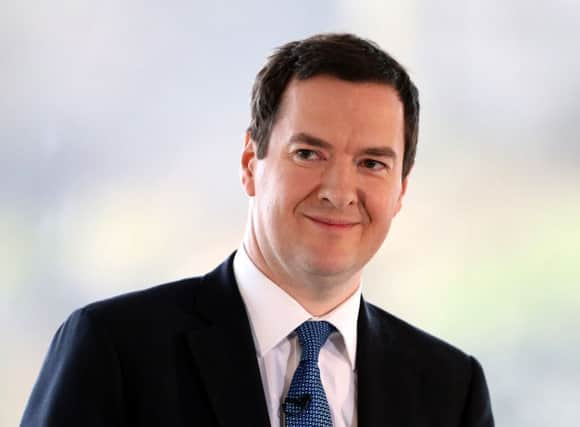Boost puts George Osborne ‘on track’ to cut debt


Mr Osborne said the figures were “further proof that the government’s long-term economic plan is working” as he sought to burnish the Conservatives’ economic credentials ahead of May’s general election with the last set of borrowing figures before next month’s Budget.
The figures – excluding the effect of bank bailouts – were in the black by £8.8 billion, up £2.3bn on the year before and at the best level since January 2008, though slightly short of expectations.
Advertisement
Hide AdAdvertisement
Hide AdTreasury coffers were swelled by a record take from self-assessment income tax receipts, up £1.7bn compared with the same month in 2014 at £12.3bn.
January is traditionally a surplus month for public finances but at the start of this year it was boosted by some self-assessment taxpayers apparently deferring payments to take advantage of more favourable tax rates. Borrowing for the fiscal year starting in April 2014 is now £74bn, some 7.5 per cent or £6bn lower than the same period last year.
This is better than the annual fall in the deficit of 6 per cent forecast by the independent Office for Budget Responsibility (OBR) after several months when it has been lagging behind.
The year-to-date figure was also boosted by a £3.6bn revision to public finances for April to December, including a £1.2bn rebate from the UK’s increased contribution to the European Commission.
Government departments also spent £1.5bn less than had been expected while VAT and income tax receipts were higher than previously thought.
Mr Osborne said the latest figures came at the end of a “week of economic milestones”, with record high employment and inflation at a record low of 0.3 per cent.
He said: “Today we learn that January saw the largest monthly surplus in the public finances since the crisis, putting us on track to meet our borrowing forecasts and halve the deficit as a share of GDP this year.”
Mr Osborne added: “All of this progress will be at risk unless we carry on working through the plan that is delivering stability and rising living standards.”
Advertisement
Hide AdAdvertisement
Hide AdBut Chris Leslie, shadow chief secretary to the Treasury, said the Chancellor had broken his promise to balance the books by this year and said Labour planned a “tough but balanced approach” as opposed to “extreme” cuts from the Tories.
In January’s figures, income tax and capital gains tax saw a record month, up 6.1 per cent to £26.7bn. Stamp duty on land and property fell year-on-year for the first time since April 2012.
Receipts from this tax were 15 per cent lower than in the same month last year at £700 million, but were still at a record high for the fiscal year-to-date at £9.5bn. Underlying net debt was £1.464 trillion, or 79.6 per cent of gross domestic product.
FOLLOW US
SCOTSMAN TABLET AND MOBILE APPS